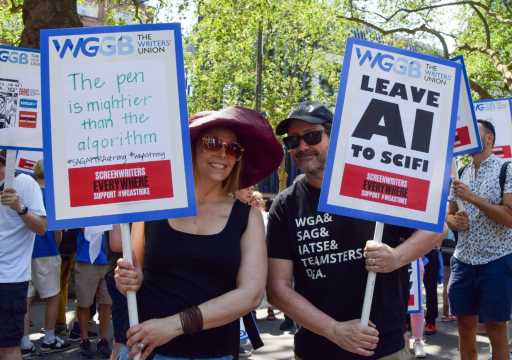Just like their U.S. counterparts, British writers fear an A.I. future.
The use of A.I. has been among the major sticking points in the ongoing U.S. writers strike and a WGGB survey today reveals 65% of UK scribes believe increased use of artificial intelligence will reduce their writing incomes. Nearly the same number (61%) are worried generative systems could replace their jobs.
Fear around the potential for A.I.’s use in creative areas such as screenwriting has been growing in the UK, with an early impact assessment from OpenAI suggesting poets, lyricists and creative writers were among the most exposed to risk fro the technology.
Related Stories

SAG-AFTRA Strike Could Hinge On AI; Deep Divisions Remain Between Actors & Studios In Final Hours Of Talks

'Barbie's Greta Gerwig Gives Shoutout To Writers As Co-Writer Noah Baumbach Skips Premiere Amid WGA Strike
The WGGB, whose members picketed against the use of A.I. at the recent WGA solidarity protest in London, has now published an official policy position, outlining the risks and potential benefits, which include its use detecting copyright infringements.
The WGGB’s main concerns are decreased job opportunities, suppression of pay, copyright infringement, use of writers’ work without permission and lack of adequate government regulation. Eighty-one percent said writers should be paid a fee when their work is used by an A.I. system.
Though British writers believe A.I. systems are not yet complex enough to “accurately mimic the standard of writing produced by professional writers,” they expect this to be a “likely future scenario,” the WGGB wrote.
However, the union said that A.I., if used in an “ethical, transparent and responsible way,” would allow writers to diversify their income streams and sustain their careers.
The WGGB policy, titled ‘Writers and AI,’ makes several recommendations. These include
- A.I. developers only using writers’ work if they are given express permission to do so
- A.I. developers should maintain “clear and accessible logs” of how they train their tools so writers can check if their work has been used
- Clear labelling of content generated or decisions made through A.I. systems
- The need for an independent regulator to monitor and oversee the expansion of A.I.
- No exceptions to copyright infringements on the basis of text and data mining for commercial purposes
- Clear, accessible and affordable routes to writers to challenge A.I. developers’ practises and bring claims if necessary
“There have been some incredible advancements in A.I., but as with any new technology we need to weigh the risks against the benefits and ensure that the speed of development does not outpace or derail the protections that writers and the wider creative workforce rely upon to make a living,” said WGGB Deputy General Secretary Lesley Gannon.
“Regulation is clearly needed to safeguard workers’ rights, and protect audiences from fraud and misinformation. WGGB is proposing a series of sensible recommendations that will help protect and reassure the writing community, whilst allowing them to enjoy the benefits of this undoubtedly powerful tool.”
The WGGB survey was carried out in April and received more than 500 responses.
Must Read Stories
Hollywood Studios’ WGA Strike Endgame Is To Let Writers Go Broke Before Resuming Talks In Fall
‘Dead Reckoning Part One’ Looking To Light Up $6M-$7M In Previews
Fox Unveils Strike-Proof Fall Sked With Reality-Heavy Plan; ‘Kitchen Nightmares’ & ‘Lego Masters’ On Move
Behind The Scenes Of Pubcaster’s Messy, Murky Crisis Over Presenter Sex Pics Allegations: A Timeline
Read More About:
Source: Read Full Article




